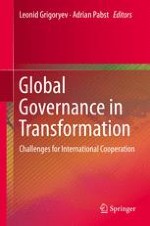2020 | OriginalPaper | Chapter
5. Back to Nukes? Global Governance’s Transitional Moment
Author : Renato G. Flôres Jr
Published in: Global Governance in Transformation
Publisher: Springer International Publishing
Activate our intelligent search to find suitable subject content or patents.
Select sections of text to find matching patents with Artificial Intelligence. powered by
Select sections of text to find additional relevant content using AI-assisted search. powered by
